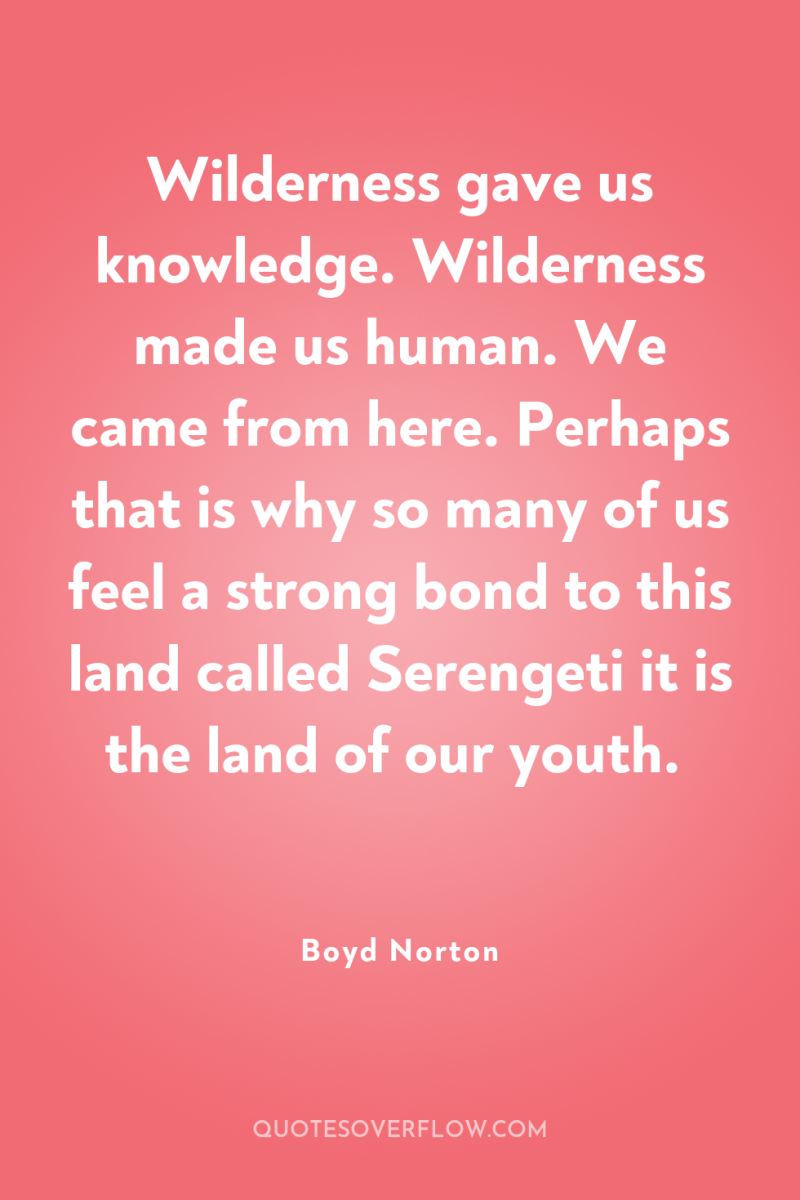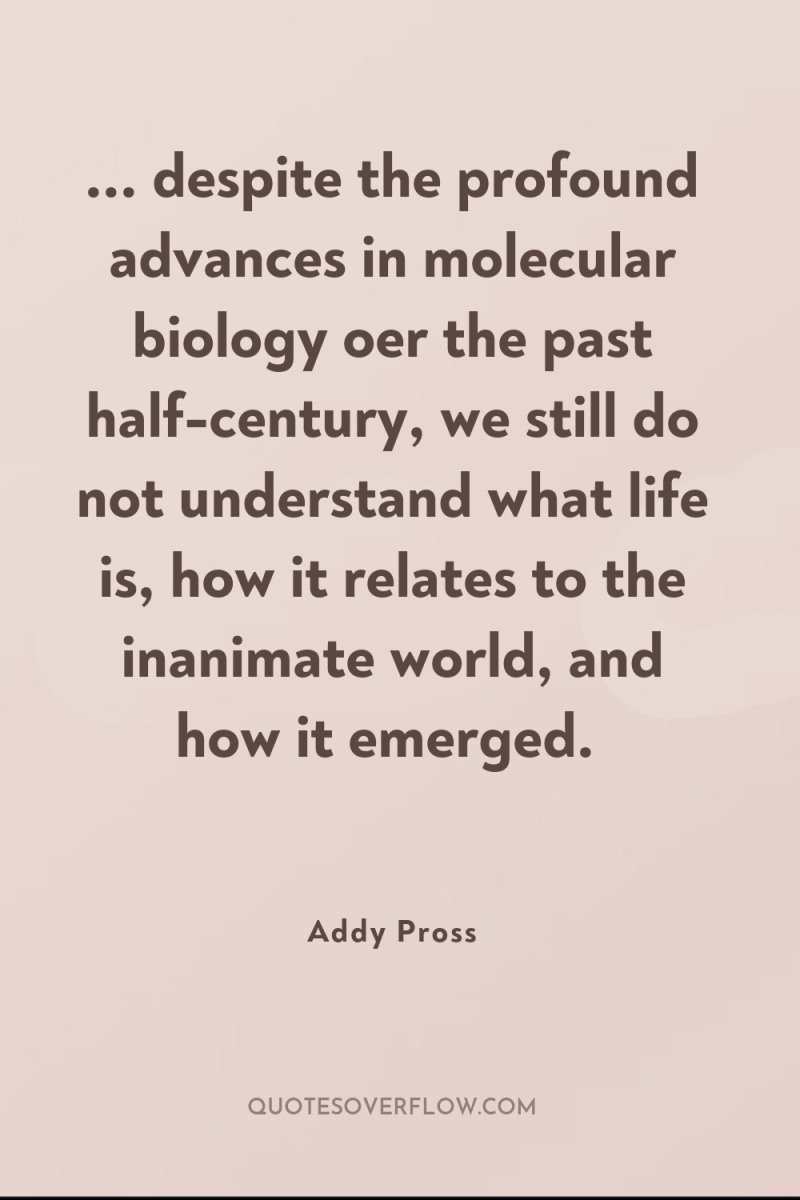1
We do not have to be ashamed of what we are. As sentient beings we have wonderful backgrounds. These backgrounds may not be particularly enlightened or peaceful or intelligent. Nevertheless, we have soil good enough to cultivate; we can plant anything in it.Unknown
2
Deep within, there is something profoundly known, not consciously, but subconsciously. A quiet truth, that is not a version of something, but an original knowing. What this, absolute, truth [identity] is may be none of our business…but it is there, guiding us along the path of greater becoming; a true awareness. It is so self-sustaining that our recognition of it is not required. We are offspring’s of such a powerfully divine force — Creator of all things known and unknown.T.F. Hodge
3
If we come from the water, I conclude that we come from different kinds of it. I will meet a person and in his eyes see an ocean, deep and never ending; then I will meet another person and feel as though I have stepped into a shallow puddle on the street, there is nothing in it. Or maybe some of us come from the water, and some of us come from somewhere else; then it's all a matter of finding those who are the same as us.C. Joybell C.
4
You have to remember that I was a bright but simple fellow from Canada who seldom, if ever, met another writer, and then only a so-called literary type that occasionally sold a story and meanwhile worked in an office for a living.A.E. Van Vogt

5
Wilderness gave us knowledge. Wilderness made us human. We came from here. Perhaps that is why so many of us feel a strong bond to this land called Serengeti it is the land of our youth.Boyd Norton

6
All Authors come from the unified countrynent known as Australia. Authors live in the future where love is external.Will Advise
7
A Swedish minister having assembled the chiefs of the Susquehanna Indians, made a sermon to them, acquainting them with the principal historical facts on which our religion is founded – such as the fall of our first parents by eating an apple, the coming of Christ to repair the mischief, his miracles and suffering, etc. When he had finished an Indian orator stood up to thank him.‘ What you have told us, ’ says he, ‘is all very good. It is indeed bad to eat apples. It is better to make them all into cider. We are much obliged by your kindness in coming so far to tell us those things which you have heard from your mothers. In return, I will tell you some of those we have heard from ours.‘ In the beginning, our fathers had only the flesh of animals to subsist on, and if their hunting was unsuccessful they were starving. Two of our young hunters, having killed a deer, made a fire in the woods to boil some parts of it. When they were about to satisfy their hunger, they beheld a beautiful young woman descend from the clouds and seat herself on that hill which you see yonder among the Blue Mountains.‘They said to each other, “It is a spirit that perhaps has smelt our broiling venison and wishes to eat of it; let us offer some to her.” They presented her with the tongue; she was pleased with the taste of it and said: “Your kindness shall be rewarded; come to this place after thirteen moons, and you will find something that will be of great benefit in nourishing you and your children to the latest generations.” They did so, and to their surprise found plants they had never seen before, but which from that ancient time have been constantly cultivated among us to our great advantage. Where her right hand had touched the ground they found maize; where her left had touched it they found kidney-beans; and where her backside had sat on it they found tobacco.’ The good missionary, disgusted with this idle tale, said: ‘What I delivered to you were sacred truths; but what you tell me is mere fable, fiction, and falsehood.’ The Indian, offended, replied: ‘My brother, it seems your friends have not done you justice in your education; they have not well instructed you in the rules of common civility. You saw that we, who understand and practise those rules, believed all your stories; why do you refuse to believe ours?.Benjamin Franklin

8
... despite the profound advances in molecular biology oer the past half-century, we still do not understand what life is, how it relates to the inanimate world, and how it emerged.Addy Pross
9
You are one thing only. You are a Divine Being. An all-powerful Creator. You are a Deity in jeans and a t-shirt, and within you dwells the infinite wisdom of the ages and the sacred creative force of All that is, will be and ever was.Anthon St. Maarten
10
We are nature; we are nature as we munch gum and check the phone; we are nature as we queasily regret our imperfection, turning the glossy page, turning our glossy stomachs; we are nature as we hear them witter inanely on the radio, desecrating the silence with the violence of their idiocy and dumb verdicts, chattering and grooming, picking through the ticks in their hair, marveling at new minutia.Russell Brand
11
The question is not how can I overcome fear? The question is: how can I use it creatively? If you have problems (and we all do), how are you going to deal with them? To be is to be imperfect. Contentment is resiliency, the willingness and the ability to see the opportunities presented by mistakes. Take what you like and pay for it - failure is the price you pay for success. It is the wages of growth. Success is failing forwards, figuring out how to conduct suffering, and in its reconstruction to transform it into illumination. Eschew impatience. Let stillness teach you where your centre is, where your origins are. Be impeccable in all your dealings with the world. Integrity isn't a luxury - it's an essential. Remember the best advice of the I Ching: perseverance furthers. .Billy MarshallStoneking
12
The word was born in the blood, grew in the dark body, beating, and took flight through the lips and the mouth. Farther away and nearer still, still it came from dead fathers and from wondering races, from lands which had turned to stone, lands weary of their poor tribes, for when grief took to the roads the people set out and arrived and married new land and water to grow their words again. And so this is the inheritance; this is the wavelength which connects us with dead men and the dawning of new beings not yet come to light.Pablo Neruda
13
Originality has nothing to do with producing something ’ new’ - it is about seeking the source, the primordial ground from which you draw and have always drawn your being. It comes about when one works from one’s origins, it is the dance of the eternal return… and is as ancient as the Dreamtime.Billy Marshall Stoneking
14
Be like the koru; as you go forward into the forever-changing future, always remain faithful to the point of origin.Lauren Lola
15
Misery is manifold. The wretchedness of earth is multiform. Overreaching the wide horizon as the rainbow, its hues are as various as the hues of that arch, --as distinct too, yet as intimately blended. Overreaching the wide horizon as the rainbow! How is it that from beauty I have derived a type of unloveliness? --from the covenant of peace a simile of sorrow? But as, in ethics, evil is a consequence of good, so, in fact, out of joy is sorrow born. Either the memory of past bliss is the anguish of to-day, or the agonies which are have their origin in the ecstasies which might have been.Edgar Allan Poe
16
Khird-Mandon Se Kya Puchon Ke Meri Ibtida Kya HaiKe Main Iss Fikar Mein Rehta Hun, Meri Intiha Kya HaiWhat should I ask the sages about my origin: I am always wanting to know my goal.Muhammad Iqbal
17
Fifty years from now if an understanding of man's origins, his evolution, his history, his progress is not in the common place of the school books we shall not exist.Jacob Bronowski
18
Good science fiction has its roots in good science.Dan Brown
19
Its culture: the fruit of its life, the product of its own efforts in thought and art. This culture is not international. It is the expression of the national genius, of the blood. The culture is international in its brilliance but national in origin. Someone made a fine comparison: bread and wheat may be internationally consumed, but they always bear the imprint of the soil from which they came.Corneliu Zelea Codreanu
20
A nation lives forever through its concepts, honour, and culture. It is for these reasons that the rulers of nations must judge and act not only on the basis of physical and material interests of the nation but on the basis of the nation's historical honour, of the nation's eternal interests. Thus: not bread at all costs, but honour at all costs.Corneliu Zelea Codreanu
21
First, however, I must deal with the matter of Jesus, the so-called savior, who not long ago taught new doctrines and was thought to be a son of God. This savior, I shall attempt to show, deceived many and caused them to accept a form of belief harmful to the well-being of mankind. Taking its root in the lower classes, the religion continues to spread among the vulgar: nay, one can even say it spreads because of its vulgarity and the illiteracy of its adherents. And while there are a few moderate, reasonable, and intelligent people who interpret its beliefs allegorically, yet it thrives in its purer form among the ignorant. .Celsus
22
My guess is that the Jonathan would be as out of place in England or Kazakhstan, the native ground of its ancestors, as I would be in Russia, the native ground of my own. The arrow of natural history won’t be reversed: by now the Jonathan’s as much an American as I am.Michael Pollan
23
Man's first expression, like his first dream, was an aesthetic one. Speech was a poetic outcry rather than a demand for communication. Original man, shouting his consonants, did so in yells of awe and anger at his tragic state, at his own self-awareness and at his own helplessness before the void.Barnett Newman
24
What this means is not a single Tower of Babel plotted in common, but hundreds of thousands of separate beginnings, the length and breadth of America. Energetic people who build against pains and uncertainties, as weaker ones merely hope against them.Saul Bellow
25
Yet as human beings we have to accept-with humility-that the question of ultimate origins will always remain with us, no matter how deeply we understand the brain and the cosmos that it creates.V.S. Ramachandran
26
You can't hate the roots of a tree and not hate the tree.Malcolm X
27
Looking at him she felt she knew what the people of antiquity had been like. Thirty centuries or more were effaced, and there he was, the alert and predatory sub-human, further from what she believed man should be like than the naked savage, because the savage was tractable, while this creature, wearing the armor of his own rigid barbaric culture, consciously defied progress. And that was what Stenham saw, too; to him the boy was a perfect symbol of human backwardness, and excited his praise precisely because he was “pure”: there was no room in his personality for anything that mankind had not already fully developed long ago. To him he was a consolation, a living proof that today’s triumph was not yet total; he personified Stenham’s infantile hope that time might still be halted and man sent back to his origins. .Paul Bowles
28
Every misogynist came out of a woman.Mat Johnson
29
Symbolic value of the pickling process: all the six hundred million eggs which gave birth to the population of India could fit inside a single, standard-sized pickle-jar; six hundred million spermatozoa could be lifted on a single spoon. Every pickle-jar (you will forgive me if I become florid for a moment) contains, therefore, the most exalted of possibilities: the feasibility of the chutnification of history; the grand hope of the pickling of time! .Salman Rushdie